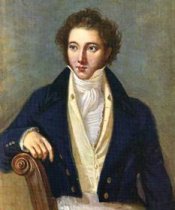First Performance: 11 March 1830 at Teatro La Fenice,
Venice.
Principal Characters:
| Capellio, head of the Capuleti |
Bass |
| Giulietta, his daughter |
Soprano |
| Romeo, head of the Montecchi |
Mezzo-Soprano |
| Tebaldo, partisan of the Capuleti, betrothed to Giulietta |
Tenor |
| Lorenzo, doctor and adviser to Capellio |
Tenor |
Time and Place: 13th Century Verona
Synopsis:
Part One
Act I, Scene 1: A gallery in the Capuleti palace.
The city of Verona is torn apart by civil strife. The followers of the
Capuleti family (the "Guelfi") oppose the followers of the Montecchi family
(the "Ghibellini"). Fearing an attack, Capellio has called his people to
exhort them to continue the struggle. He informs them that Romeo, the head of
the Montecchi, is sending an envoy with peace proposals. Capellio hates
Romeo, who recently killed his son. Lorenzo counsels them to hear the
proposals. Tebaldo, however, promises vengeance with the blood of Romeo.
Capellio thereupon offers Tebaldo his daughter, Giulietta; and they are to be
married that evening. Knowing of the secret bond between Romeo and Giulietta,
Lorenzo advises against the marriage because Giulietta is ill. Romeo, who is
known by the Capuleti only by name, arrives to discuss peace. He proposes
that the peace be sealed by the marriage of Romeo and Giulietta. Capellio
refuses and promises future bloodshed. Romeo is informed of Giulietta's
betrothal to Tebaldo.
Act I, Scene 2: A room in Giulietta's apartment.
Giulietta learns of her father's decision. She sadly calls out to her
beloved Romeo. Lorenzo arrives with Romeo through a secret door to
Giulietta's room. Romeo embraces Giulietta and urges her to run away with him.
She refuses because of her duty to obey her father.
Part Two
Act I, Scene 3: A courtyard in Capellio's palace.
The Guelfi celebrate the imminent wedding of Giulietta and Tebaldo. Romeo,
disguised as a Guelfi, confides to Lorenzo that there are a thousand armed
Ghibellini outside the city preparing to attack. Lorenzo urges him to abandon
his plans, all to no avail. The attack begins. During the commotion, Romeo
races to join his men. Giulietta enters in her wedding dress. Romeo reaches
her and urges her to follow him. Capellio and Tebaldo arrive leading the
Guelfi. They recognize Romeo as the envoy. Romeo identifies himself and
escapes with the assistance of the Ghibellini.
Part Three
Act II, Scene 1: An apartment in Capellio's palace.
Giulietta is anxious. Lorenzo tells her that Romeo is safe; however, the
wedding will take place the next day. Lorenzo devises a stratagem. He advises
her to take a potion that will produce a deathlike condition. Giulietta
immediately grasps the potion and drinks it. Capellio enters and instructs
her to retire and to prepare for the wedding. Giulietta implores him to
embrace her. Disturbed, Capellio begins to feel remorse. Harboring suspicions
of Lorenzo, he sends for Tebaldo and orders him to guard Lorenzo.
Act II, Scene 2: A deserted place near Capellio's palace.
Alarmed by the lack of news, Romeo searches for Lorenzo. He comes upon
Tebaldo who challenges him to a duel. Just as they are about to engage in
combat, they are taken aback by funeral music. It is a funeral procession to
Giulietta's tomb. Both overwhelmed with grief, Romeo and Tebaldo
disengage.
Part Four
Act II, Scene 3: At the tombs of the Capuleti.
Led by Romeo, the Ghibellini arrive to mourn. He orders her tomb to be
opened and bids farewell to Giulietta. He then takes poison. Giulietta
awakens and calls out to Romeo. She sees him at the foot of the sepulcher,
thinking that he is there at Lorenzo's instructions. She soon realizes the
truth when Romeo tells her he has taken poison. They embrace. Romeo dies and
Giuletta falls dead upon his body. The Guelfi and Ghibellini rush in and
observe the tragic scene. Capellio blames himself for the consequences of the
hatred between the two factions.
Click
here for the complete libretto.
